Financial Management Report: Decision Making and Stakeholders
VerifiedAdded on 2023/01/13
|16
|1039
|21
Report
AI Summary
This report provides an overview of financial management, emphasizing strategic planning and the organization, direction, and control of financial undertakings within a business. It explores various approaches to support financial decisions, including the knowledge-based approach and the use of decision matrices and T-charts. The report examines factors contributing to effective decision-making, such as economic conditions and capital markets, and the crucial role of stakeholders in the decision-making process. It also covers setting financial goals, ethical financial management, the roles of management accountants, and financial management systems. Furthermore, the report highlights techniques for fraud detection and prevention, concluding that sound financial decisions are essential for business success and performance analysis.

FINANCIAL
MANAGEMENT
MANAGEMENT
Paraphrase This Document
Need a fresh take? Get an instant paraphrase of this document with our AI Paraphraser

TABLE OF CONTENT
■ INTRODUCTION
■ MAIN BODY
■ CONCLUSION
■ REFERENCES
■ INTRODUCTION
■ MAIN BODY
■ CONCLUSION
■ REFERENCES
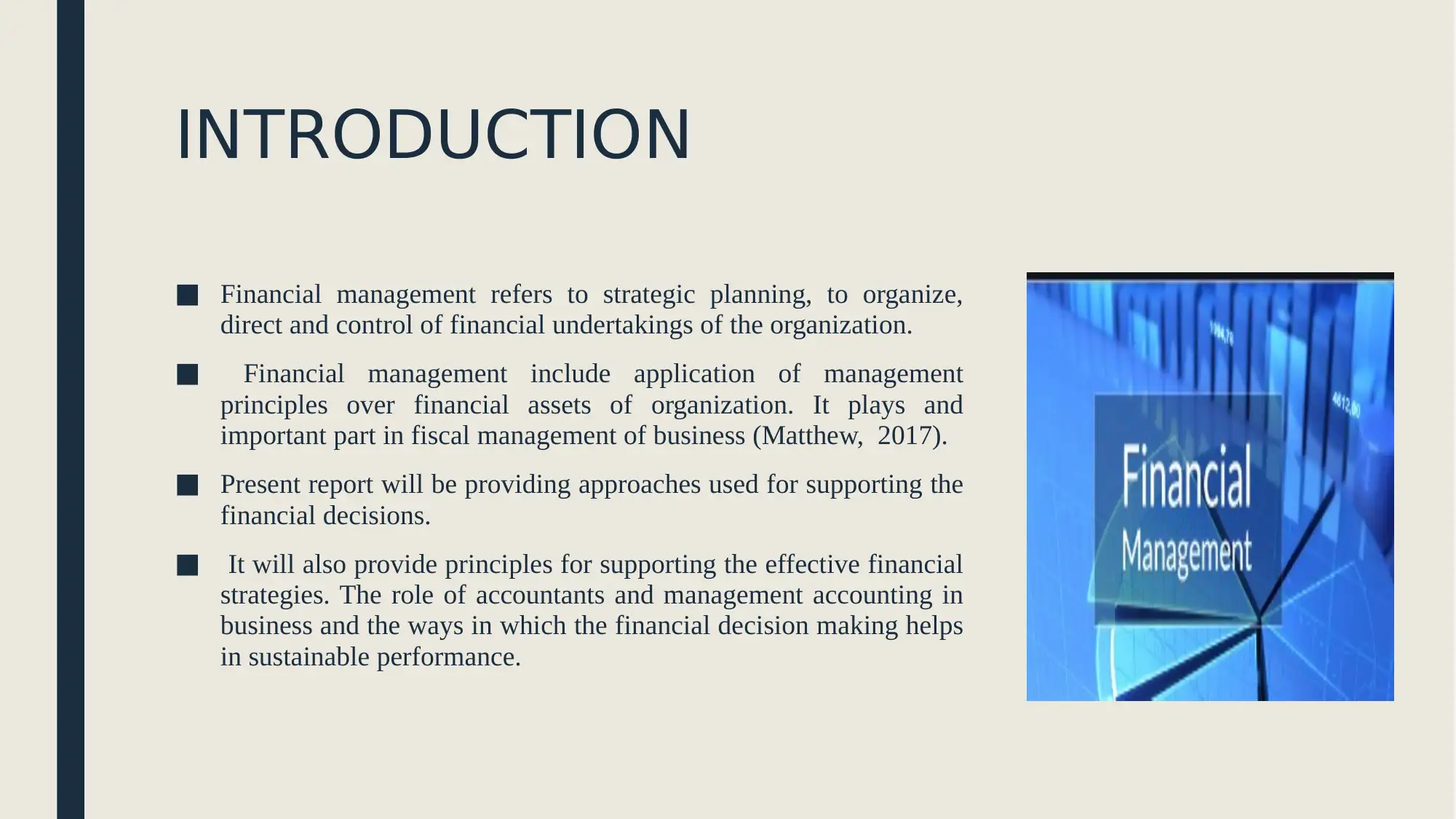
INTRODUCTION
■ Financial management refers to strategic planning, to organize,
direct and control of financial undertakings of the organization.
■ Financial management include application of management
principles over financial assets of organization. It plays and
important part in fiscal management of business (Matthew, 2017).
■ Present report will be providing approaches used for supporting the
financial decisions.
■ It will also provide principles for supporting the effective financial
strategies. The role of accountants and management accounting in
business and the ways in which the financial decision making helps
in sustainable performance.
■ Financial management refers to strategic planning, to organize,
direct and control of financial undertakings of the organization.
■ Financial management include application of management
principles over financial assets of organization. It plays and
important part in fiscal management of business (Matthew, 2017).
■ Present report will be providing approaches used for supporting the
financial decisions.
■ It will also provide principles for supporting the effective financial
strategies. The role of accountants and management accounting in
business and the ways in which the financial decision making helps
in sustainable performance.
⊘ This is a preview!⊘
Do you want full access?
Subscribe today to unlock all pages.

Trusted by 1+ million students worldwide
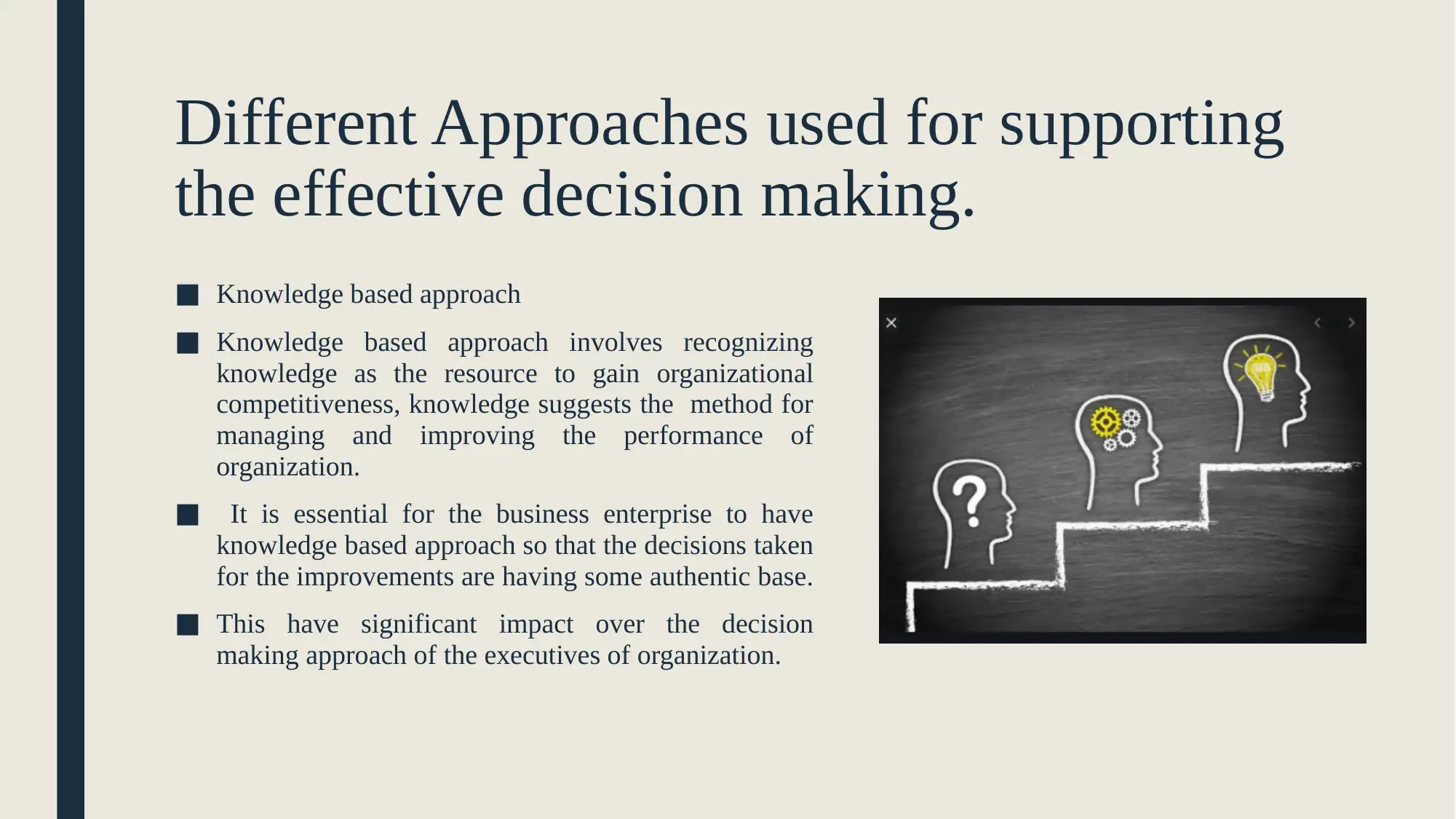
Different Approaches used for supporting
the effective decision making.
■ Knowledge based approach
■ Knowledge based approach involves recognizing
knowledge as the resource to gain organizational
competitiveness, knowledge suggests the method for
managing and improving the performance of
organization.
■ It is essential for the business enterprise to have
knowledge based approach so that the decisions taken
for the improvements are having some authentic base.
■ This have significant impact over the decision
making approach of the executives of organization.
the effective decision making.
■ Knowledge based approach
■ Knowledge based approach involves recognizing
knowledge as the resource to gain organizational
competitiveness, knowledge suggests the method for
managing and improving the performance of
organization.
■ It is essential for the business enterprise to have
knowledge based approach so that the decisions taken
for the improvements are having some authentic base.
■ This have significant impact over the decision
making approach of the executives of organization.
Paraphrase This Document
Need a fresh take? Get an instant paraphrase of this document with our AI Paraphraser
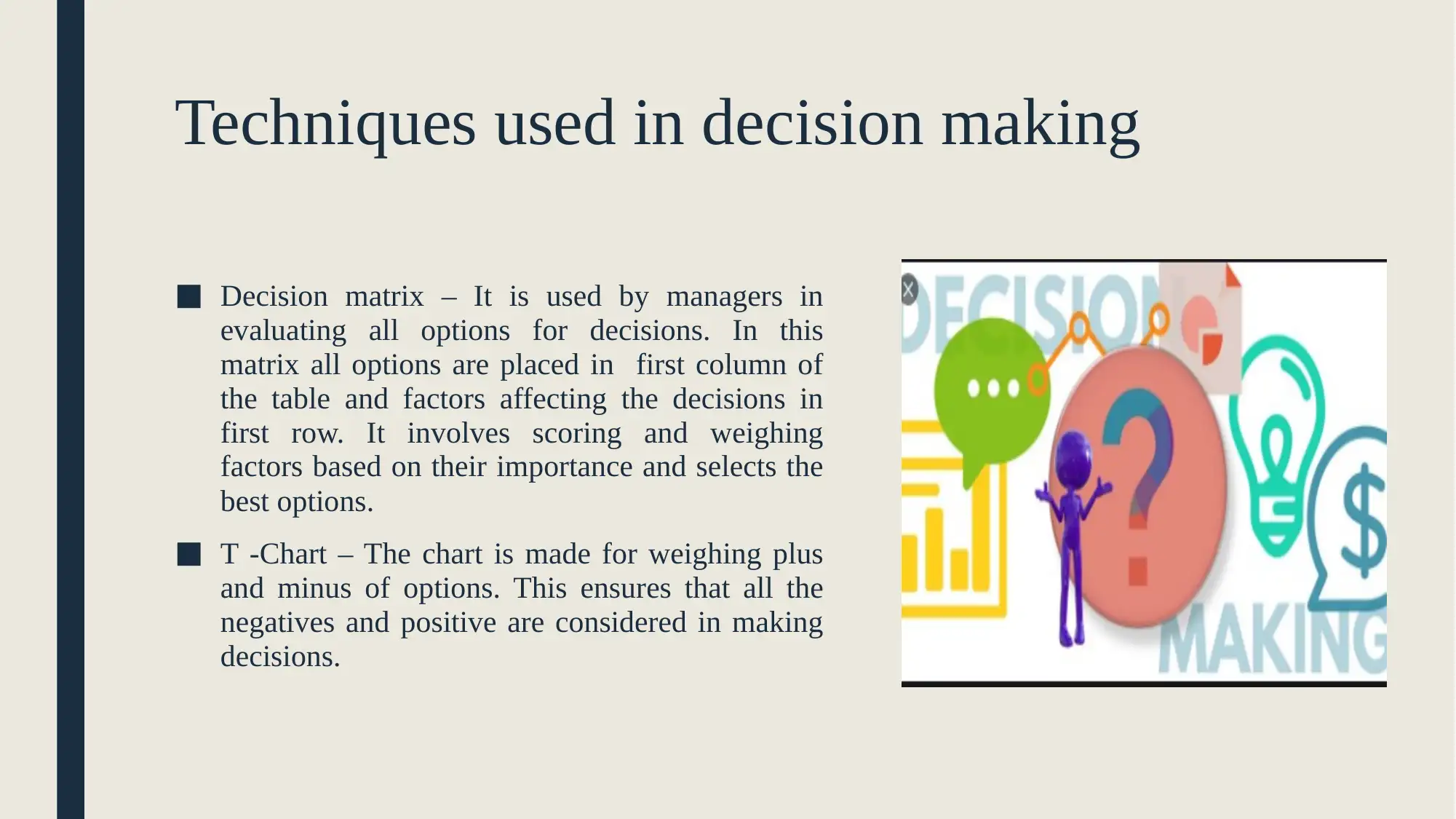
Techniques used in decision making
■ Decision matrix – It is used by managers in
evaluating all options for decisions. In this
matrix all options are placed in first column of
the table and factors affecting the decisions in
first row. It involves scoring and weighing
factors based on their importance and selects the
best options.
■ T -Chart – The chart is made for weighing plus
and minus of options. This ensures that all the
negatives and positive are considered in making
decisions.
■ Decision matrix – It is used by managers in
evaluating all options for decisions. In this
matrix all options are placed in first column of
the table and factors affecting the decisions in
first row. It involves scoring and weighing
factors based on their importance and selects the
best options.
■ T -Chart – The chart is made for weighing plus
and minus of options. This ensures that all the
negatives and positive are considered in making
decisions.
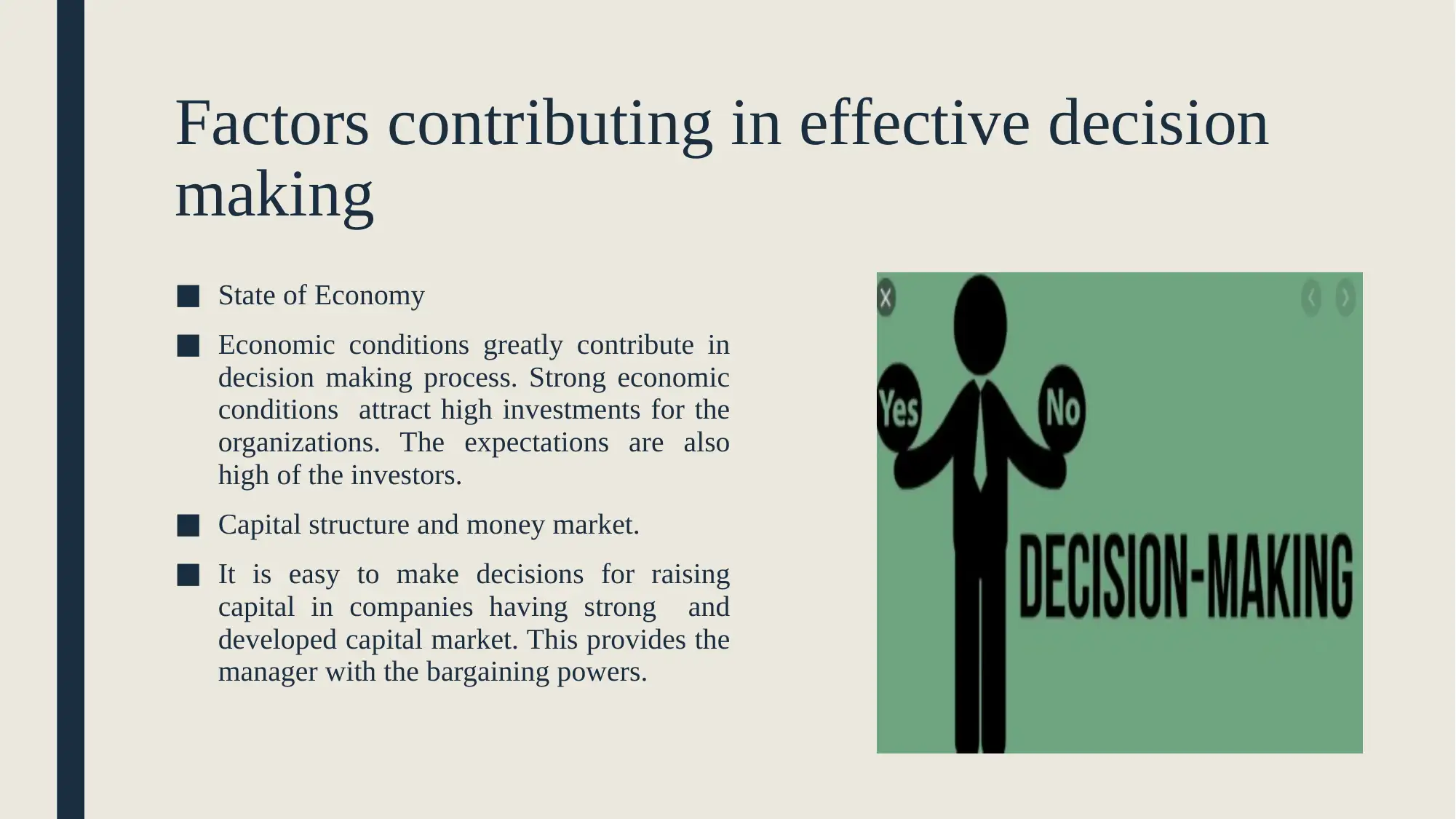
Factors contributing in effective decision
making
■ State of Economy
■ Economic conditions greatly contribute in
decision making process. Strong economic
conditions attract high investments for the
organizations. The expectations are also
high of the investors.
■ Capital structure and money market.
■ It is easy to make decisions for raising
capital in companies having strong and
developed capital market. This provides the
manager with the bargaining powers.
making
■ State of Economy
■ Economic conditions greatly contribute in
decision making process. Strong economic
conditions attract high investments for the
organizations. The expectations are also
high of the investors.
■ Capital structure and money market.
■ It is easy to make decisions for raising
capital in companies having strong and
developed capital market. This provides the
manager with the bargaining powers.
⊘ This is a preview!⊘
Do you want full access?
Subscribe today to unlock all pages.

Trusted by 1+ million students worldwide
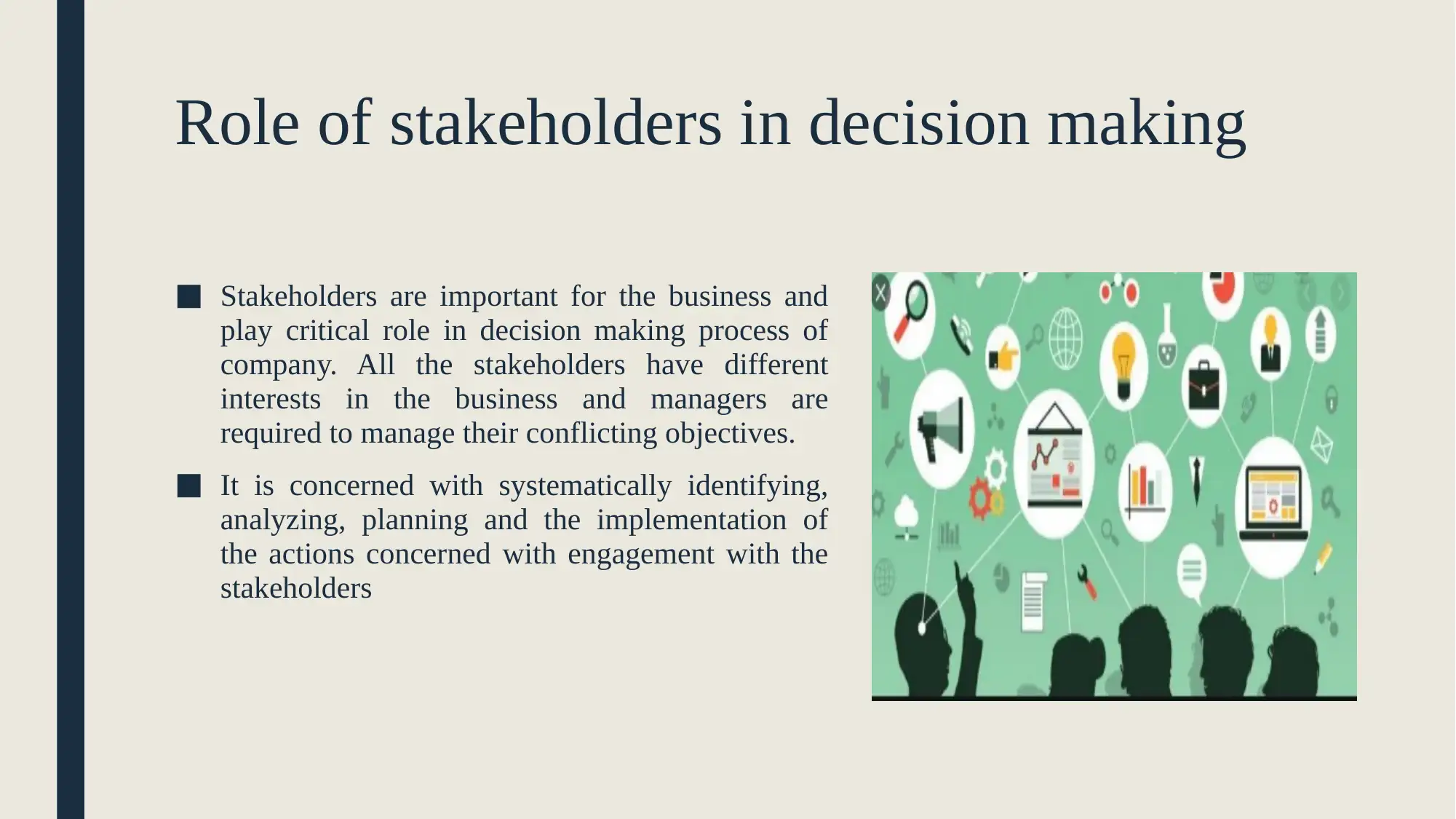
Role of stakeholders in decision making
■ Stakeholders are important for the business and
play critical role in decision making process of
company. All the stakeholders have different
interests in the business and managers are
required to manage their conflicting objectives.
■ It is concerned with systematically identifying,
analyzing, planning and the implementation of
the actions concerned with engagement with the
stakeholders
■ Stakeholders are important for the business and
play critical role in decision making process of
company. All the stakeholders have different
interests in the business and managers are
required to manage their conflicting objectives.
■ It is concerned with systematically identifying,
analyzing, planning and the implementation of
the actions concerned with engagement with the
stakeholders
Paraphrase This Document
Need a fresh take? Get an instant paraphrase of this document with our AI Paraphraser
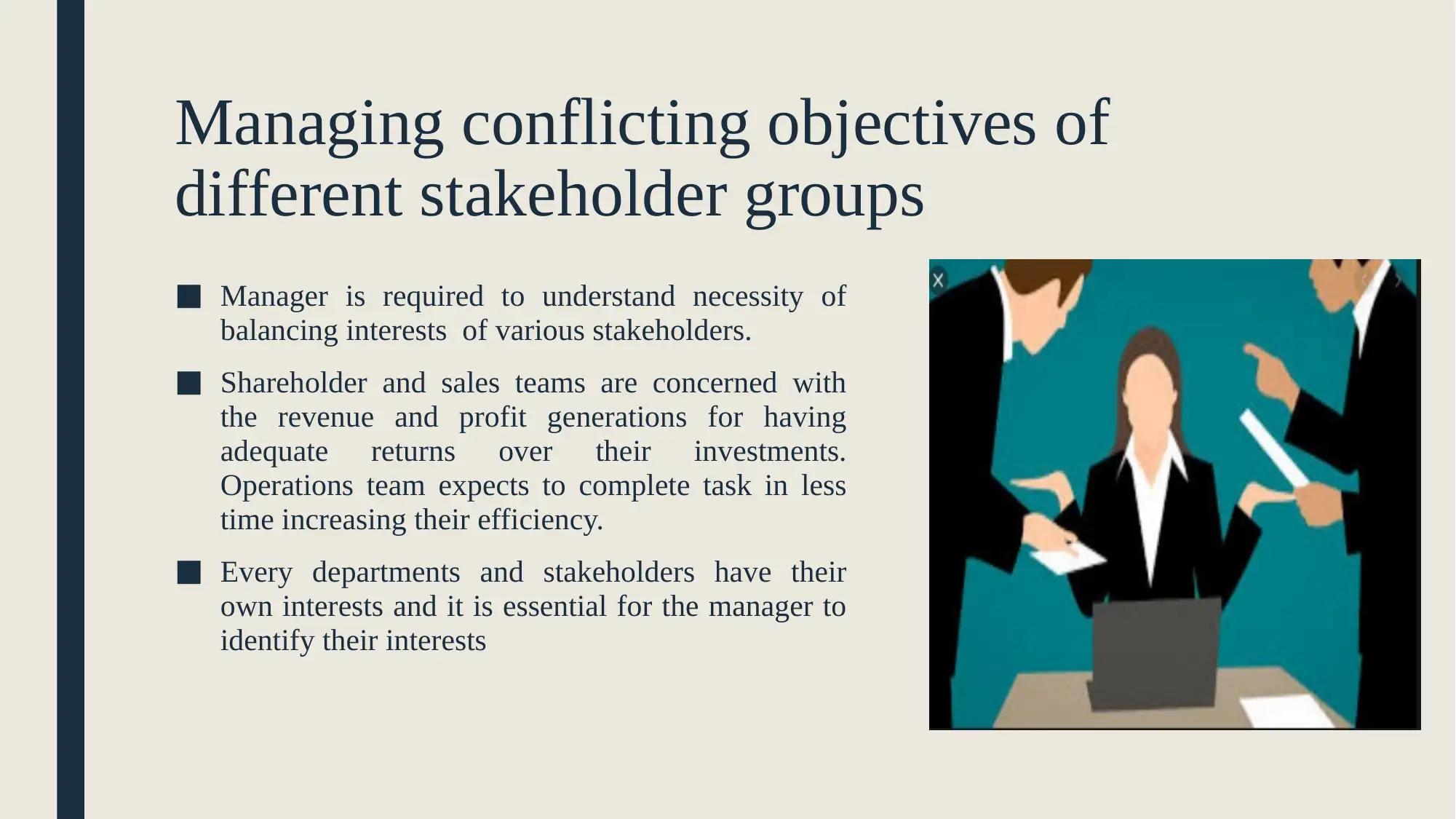
Managing conflicting objectives of
different stakeholder groups
■ Manager is required to understand necessity of
balancing interests of various stakeholders.
■ Shareholder and sales teams are concerned with
the revenue and profit generations for having
adequate returns over their investments.
Operations team expects to complete task in less
time increasing their efficiency.
■ Every departments and stakeholders have their
own interests and it is essential for the manager to
identify their interests
different stakeholder groups
■ Manager is required to understand necessity of
balancing interests of various stakeholders.
■ Shareholder and sales teams are concerned with
the revenue and profit generations for having
adequate returns over their investments.
Operations team expects to complete task in less
time increasing their efficiency.
■ Every departments and stakeholders have their
own interests and it is essential for the manager to
identify their interests
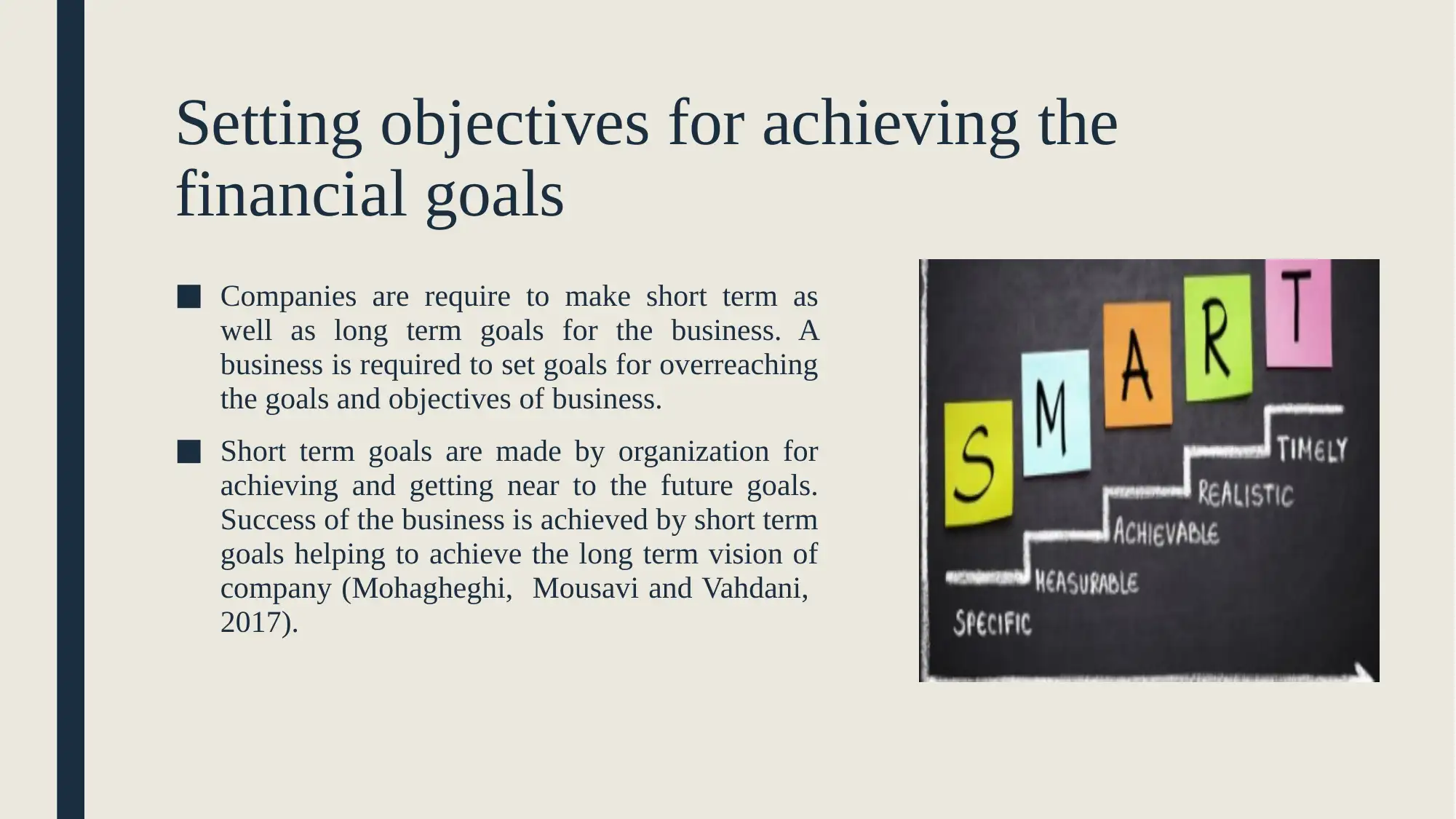
Setting objectives for achieving the
financial goals
■ Companies are require to make short term as
well as long term goals for the business. A
business is required to set goals for overreaching
the goals and objectives of business.
■ Short term goals are made by organization for
achieving and getting near to the future goals.
Success of the business is achieved by short term
goals helping to achieve the long term vision of
company (Mohagheghi, Mousavi and Vahdani,
2017).
financial goals
■ Companies are require to make short term as
well as long term goals for the business. A
business is required to set goals for overreaching
the goals and objectives of business.
■ Short term goals are made by organization for
achieving and getting near to the future goals.
Success of the business is achieved by short term
goals helping to achieve the long term vision of
company (Mohagheghi, Mousavi and Vahdani,
2017).
⊘ This is a preview!⊘
Do you want full access?
Subscribe today to unlock all pages.

Trusted by 1+ million students worldwide
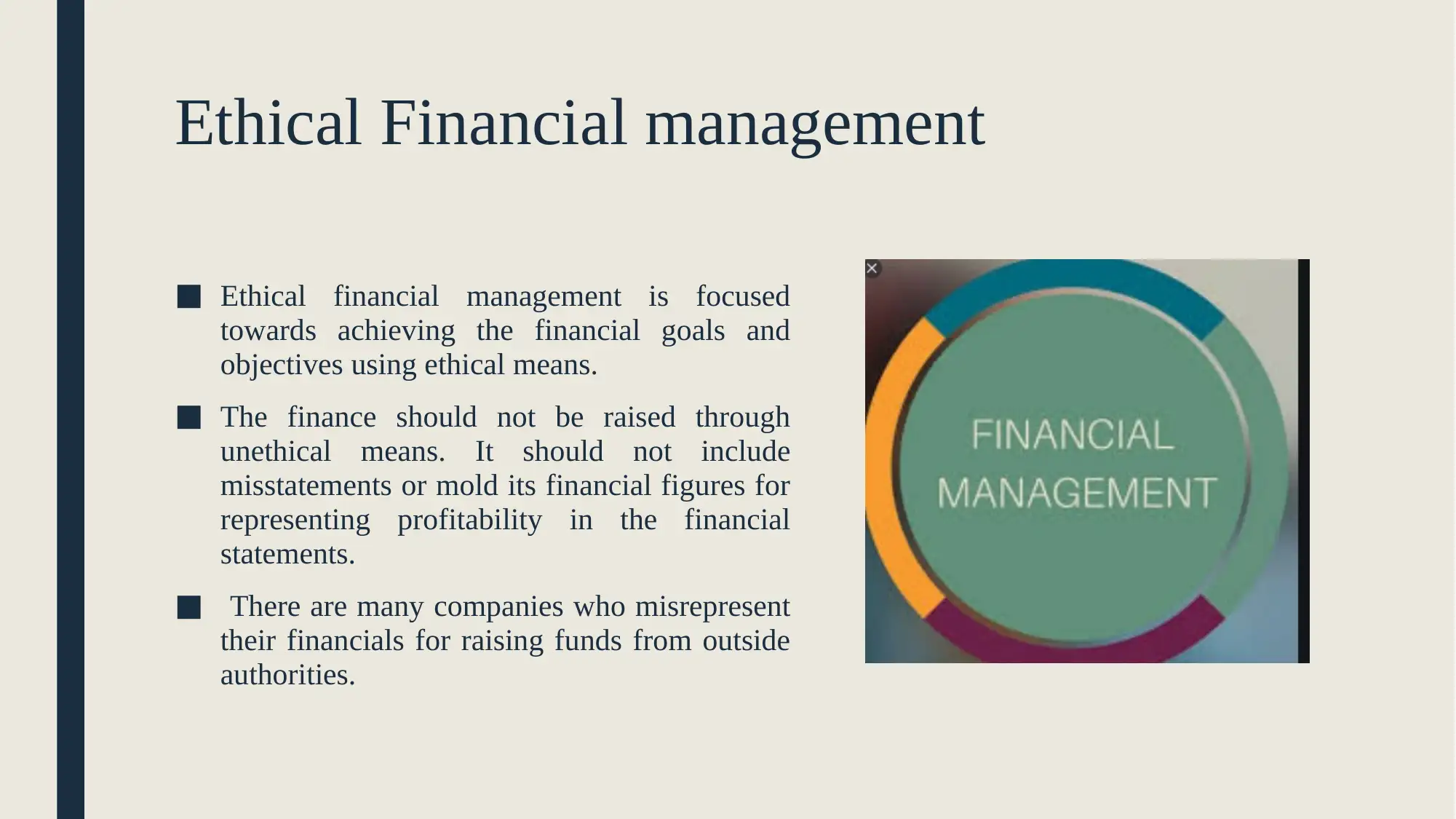
Ethical Financial management
■ Ethical financial management is focused
towards achieving the financial goals and
objectives using ethical means.
■ The finance should not be raised through
unethical means. It should not include
misstatements or mold its financial figures for
representing profitability in the financial
statements.
■ There are many companies who misrepresent
their financials for raising funds from outside
authorities.
■ Ethical financial management is focused
towards achieving the financial goals and
objectives using ethical means.
■ The finance should not be raised through
unethical means. It should not include
misstatements or mold its financial figures for
representing profitability in the financial
statements.
■ There are many companies who misrepresent
their financials for raising funds from outside
authorities.
Paraphrase This Document
Need a fresh take? Get an instant paraphrase of this document with our AI Paraphraser
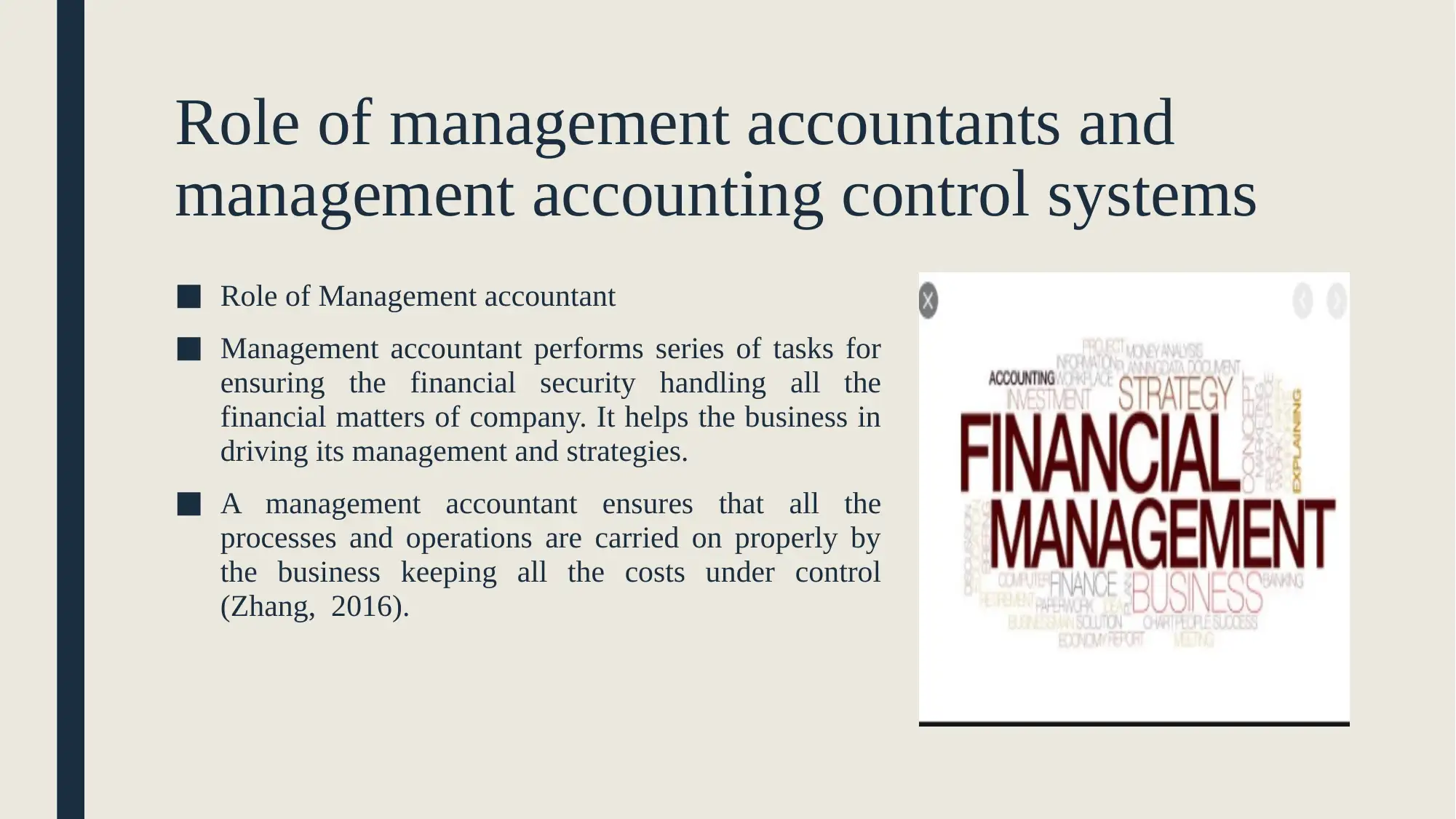
Role of management accountants and
management accounting control systems
■ Role of Management accountant
■ Management accountant performs series of tasks for
ensuring the financial security handling all the
financial matters of company. It helps the business in
driving its management and strategies.
■ A management accountant ensures that all the
processes and operations are carried on properly by
the business keeping all the costs under control
(Zhang, 2016).
management accounting control systems
■ Role of Management accountant
■ Management accountant performs series of tasks for
ensuring the financial security handling all the
financial matters of company. It helps the business in
driving its management and strategies.
■ A management accountant ensures that all the
processes and operations are carried on properly by
the business keeping all the costs under control
(Zhang, 2016).
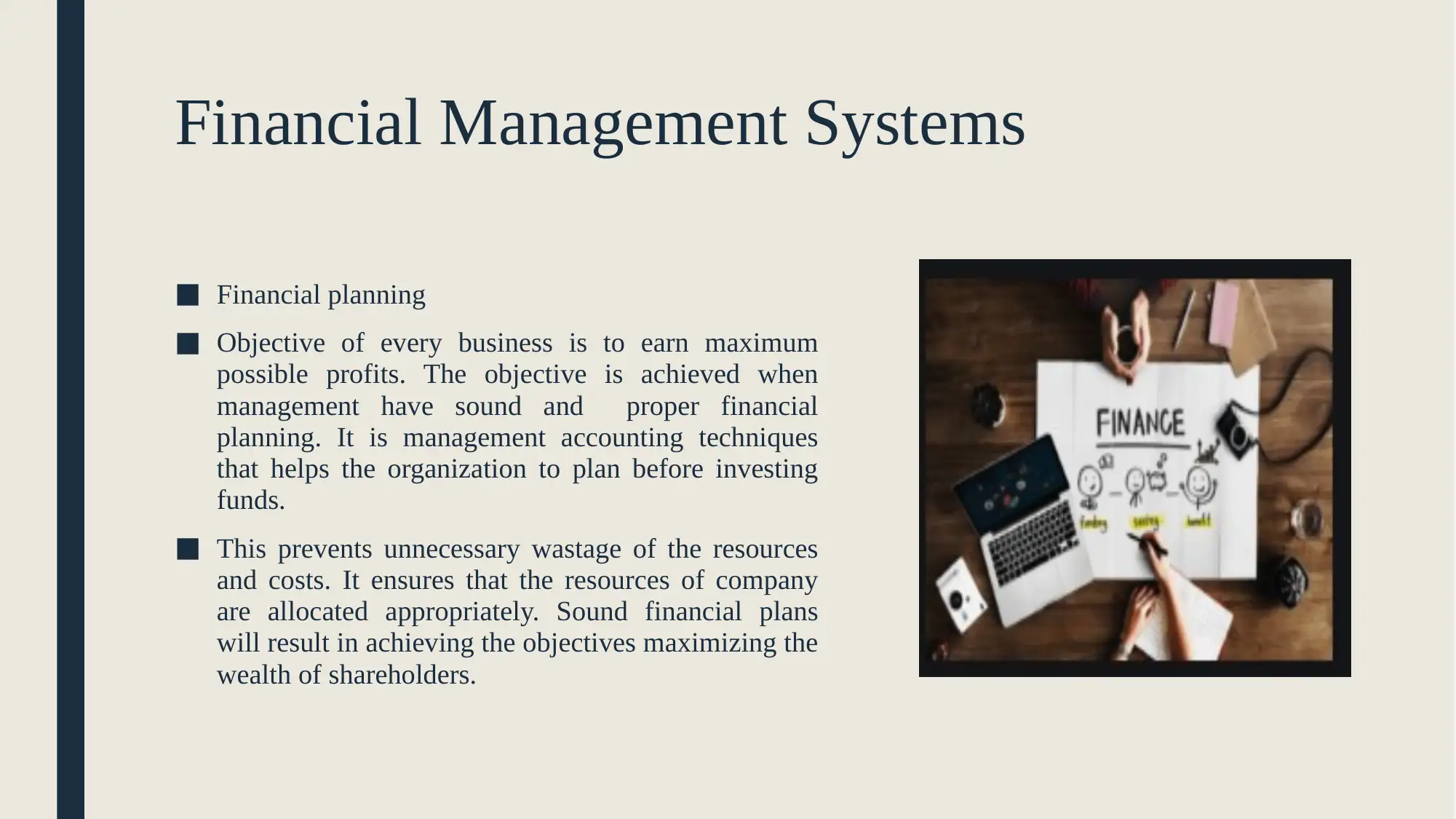
Financial Management Systems
■ Financial planning
■ Objective of every business is to earn maximum
possible profits. The objective is achieved when
management have sound and proper financial
planning. It is management accounting techniques
that helps the organization to plan before investing
funds.
■ This prevents unnecessary wastage of the resources
and costs. It ensures that the resources of company
are allocated appropriately. Sound financial plans
will result in achieving the objectives maximizing the
wealth of shareholders.
■ Financial planning
■ Objective of every business is to earn maximum
possible profits. The objective is achieved when
management have sound and proper financial
planning. It is management accounting techniques
that helps the organization to plan before investing
funds.
■ This prevents unnecessary wastage of the resources
and costs. It ensures that the resources of company
are allocated appropriately. Sound financial plans
will result in achieving the objectives maximizing the
wealth of shareholders.
⊘ This is a preview!⊘
Do you want full access?
Subscribe today to unlock all pages.

Trusted by 1+ million students worldwide
1 out of 16
Related Documents
Your All-in-One AI-Powered Toolkit for Academic Success.
+13062052269
info@desklib.com
Available 24*7 on WhatsApp / Email
![[object Object]](/_next/static/media/star-bottom.7253800d.svg)
Unlock your academic potential
Copyright © 2020–2026 A2Z Services. All Rights Reserved. Developed and managed by ZUCOL.





